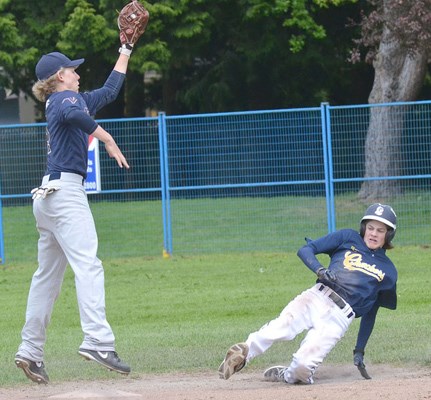Its a sunny day and the stands are full of eager parents, eyes peeled and trained on the 11-year-old whos just stepped up to the plate.
Under pressure to please, the player, a child, throws a nervous swing and a miss.
His first worried glance is not towards his coach or his teammates, who he feels he may have let down. Its in the direction of the stands.
Its a tense scenario that Alex Klenman accomplished head coach for the U15 Richmond Bantam AAA Chuckers, packing more than 23 years experience has seen too many times for his liking.
You get some (parents) whore very vocal, who make their presence known, said Klenman, who grew up playing the game in L.A.
Then theres some whose mere presence can have a negative effect. The young players know theyre there, because the kid might miss and you see them looking at the stands.
If they do catch their parents eye, they get the stare or the glare. Kids are under enough pressure playing the game without having over-reactive parents on them.
Although acknowledging parents can have a very positive effect and that he has a terrific parent group, Klenman has seen too many kids walk away from the game at a very early age because theyre overloaded by parental pressure.
Ive seen kids in tears because of the parents, and its not acceptable really, he said.
They all mean well, and they all want the best for their children. Believe me, I know what theyre going through, Ive been the parent in the stands and as a coach, I know its not easy.
Kids are not the only ones being worried away from the sport, however. Coaches, too, often steer clear of taking on a team because of the spectre of dealing with problem parents.
A lot of good coaches dont coach because they dont have the people skills to deal with difficult parents, said Klenman.
Coaching is actually the easy part. And theres nothing worse than getting home two hours later than everyone because you had to meet parents after a game or practice.
Theres no training for these situations and I think parents have to think about that. They can easily make your experience memorable or forgettable for very different reasons.
The best advice for the coach in managing the parents, said Klenman, is to set out your and your organizations expectations very early on.
I start all seasons with parent meetings, partly because some parents believe they can do a better job.
But I tell them, when the kids are here, theyre ours; this is the kids environment.
And no matter how bad things seem to be, parents have to support their kids in a positive manner, said Klenman.
No one is harder on the kid than themselves, so why would the parent need to add to it as well?



